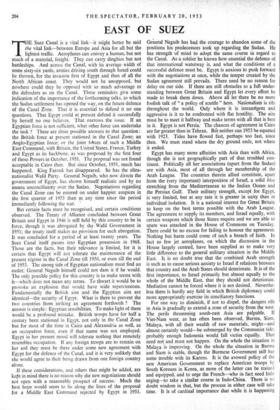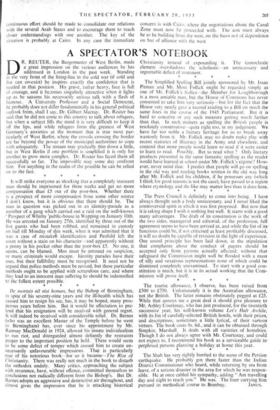EAST OF SUEZ
1
? IHE Suez Canal is a vital link—it might better be said the vital link—between Europe and Asia for all but the lightest traffic. Aeroplanes can convey a human, but not much of a material, freight. They can carry dinghies but not battleships. And across the Canal, with its average width of some sixty-six yards, armies driving south through Israel could be thrown, for the invasion first of Egypt and then of all the North African coast. They would not be unopposed, but nowhere could they be opposed with so much advantage to the defenders as on the Canal. These reminders give some indication of the importance of the forthcoming talks, to which the Sudan settlement has opened the way, on the future defence of the Canal Zone. That it is essential to defend it no one questions. That Egypt could at present defend it successfully by herself no one believes. That narrows the issue. If an Egyptian force is not sufficient, what other force can undertake the task ? There are three possible answers to that question : the British force at present stationed in the Canal Zone; an Anglo-Egyptian force; or the joint fdrces of such a Middle East Command, with Britain, the United States, France, Turkey and Egypt as its backbone, as was proposed by the first four of those Powers in October, 1951. The proposal was not found acceptable in Cairo then. But since October, 1951, much has happened. King Farouk has disappeared. So has the ultra- nationalist Wafd Party. General Neguib, who now directs the government of Egypt, has shown himself realistic and by no means unconciliatory over the Sudan. Negotiations regarding the Canal Zone can be entered on under happier auspices in the first quarter of 1953 than at any time since the period immediately following the war. '
But certain facts must be recognised, and certain conditions observed. The Treaty of Alliance concluded between Great Britain and Egypt in 1946 is still held by this country to be in force, though it was abrogated by the Wafd Government in 1951; the treaty itself makes no provision for such abrogation. It was concluded for a period of at least twenty years. The Suez Canal itself passes into Egyptian possession in 1968. Those are the facts, but their relevance is limited, for it is certain that Egypt will not tolerate the maintenance of the present regime in the Canal Zone till 1956, or even till the end of 1953. The strong tide of Egyptian nationalism must find an outlet; General Neguib himself could not dam it if he would. The only possible policy for this country is to make terms with it—which does not mean any terms. To thwart it would be to provoke an explosion that would have wide repercussions. Fundamentally the British aim and the Egyptian aim are identical—the security of Egypt. What is there to prevent the two countries from striking an agreement forthwith ? The answer is simple: Egyptian sensibilities. To make light of them would be a profound mistake. British troops have for half a century been stationed in Egypt, not only in the Canal Zone but for most of the time in Cairo and Alexandria as well, as an occupation force, even if that name was not employed. Egypt in her present mood will tolerate nothing that remotely resembles occupation. If any foreign troops are to remain on her soil they must be there under some new agreement with Egypt for the defence of the Canal, and it is very unlikely that she would agree to their being drawn from one foreign country alone.
If these considerations, and others that might be added, are kept in mind there is no reason why the new negotiations should not open with a reasonable prospect of success: Much the best hope would seem to lie along the lines of the proposal for a Middle East Command rejected by Egypt in 1951. General Neguib has had the courage to abandon some of the positions his predecessors took up regarding the Sudan. He has strength of mind to adopt the same course in regard to the Canal. As a soldier he knows how essential the defence of that international waterway is, and what the conditions of a successful defence must be. Egypt is anxious to push forward with the negotiations at once, while the temper created by the Sudan agreement still prevails. There need be no reason for delay on our side. If there are still obstacles to a full under- standing between Great Britain and Egypt let every effort be made to break them down. Above all let -there be no more foolish talk of "a policy of scuttle" here. Nationalism is rife throughout the world. Only where it is intransigent and aggressive is it to be confronted with flat hostility. The aim must be to meet it halfway and make terms with all that is best in it. Egypt is not Persia: The chances of agreement in Cairo are far greater than in Tehran. Rat neither can 1953 be equated with 1923. Tides have flowed fast, perhaps too fast, since then. We must stand where the dry ground ends, not where it ended.
Egypt has many more affinities with Asia than with Africa, though she is not geographically part of that troubled con- tinent. Politically all her associations (apart from the Sudan) are with Asia, most of all through her membership of the Arab League. The countries therein allied constitute, apart from the (very important) interposition of Israel, a solid bloc stretching from the Mediterranean to the Indian Ocean and the Persian Gulf. Their military strength, except for Egypt, is very limited, but at any rate it is greater in unity than in individual isolation. It is a national interest for Great Britain to keep on the best terms possible with the Arab League. The agreement to supply its members, and Israel equally, with certain weapons which those States require and we are able to spare was attacked in, the House of Commons on Tuesday. There could be no excuse for failing to honour the agreement. Nothing but harm could come of such a breach of faith. In fact so few jet aeroplanes, on which the discussion in the House largely centred, have been supplied as to make very little difference to the general military situation in the Middle East. It is no doubt true that the combined Arab strength is such as to cause serious anxiety to Israel if relations between that country and the Arab States should deteriorate. It is of the first importance, to Israel primarily but almost equally to the whole of the Middle East, that they should not deteriorate. Mediation cannot be forced where it is not desired. Neverthe- less there is hardly any field in which British diplomacy could more appropriately exercise its conciliatory functions.
For one way to diminish, if not to dispel, the dangers rife in Asia is gradually to extend a zone of security from the west. The perils threatening south-east Asia are palpable. If Viet-Nam went, as has often been observed, Burma, Siam, 'Malaya, with all their wealth of raw materials, might—and almost certainly would—be submerged by the Communist tide; probably enough Indonesia would fall victim equally. That need not and must not happen. On the whole the situation in Malaya is improving. On the whole the situation in Burma and Siam is stable, though the Burmese Government still has some trouble with its Karens. It is the avowed policy of the new American Government to replace American troops by South Koreans in Korea, as more of the latter can be trained and equipped, and to urge the French—who in fact need little urging—to take a similar course in Indo-China. There is no doubt wisdom in that, but the process in either case will take time. It is of cardinal importance that while it is happening continuous effort should be made to consolidate our relations with the several Arab States and to encourage them to reach closer understandings with one another. The key of the situation is probably at Cairo. In any case the immediate concern is with Cairo, where the negotiations about the Canal Zone must now be proceeded with. The aim must always be to be building from the west, on the basis not of dependence on but of alliance with the west.



































 Previous page
Previous page